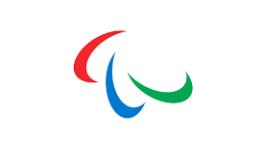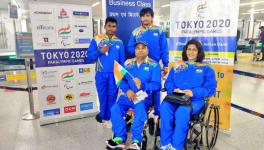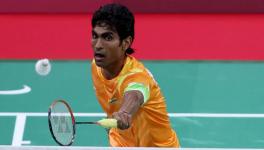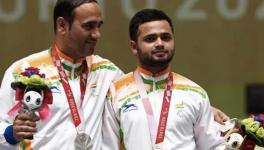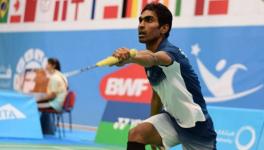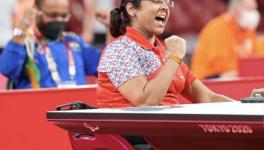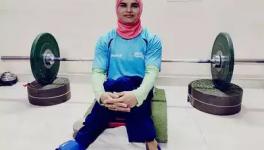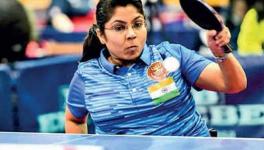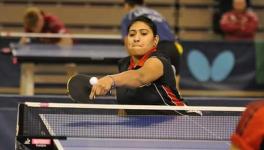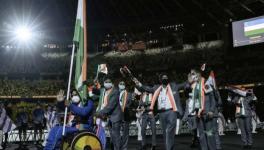Para Sports in India: Sidelined Despite the Spotlight | Tokyo Paralympics Special
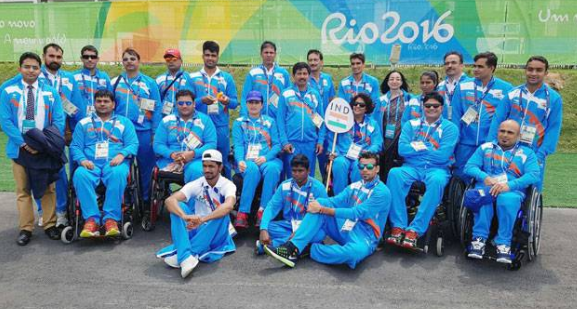
The Indian contingent at the 2016 Rio Paralympics. India returned with a haul of four medals -- two gold, a silver and a bronze.
It is August. More than five months of a global lockdown. Some countries have opened up their economies regardless of the consequences on public health. Others have opened up cautiously while regularly enforcing protocols to protect the health of their citizens. Sports has slowly crept back on to our screens. A certain kind of sport.
For those in India, the effects of the lockdowns have been more preventive than anywhere else. Sportspersons were initially barricaded in various training facilities across the country, locked into rooms with no access to tracks, treadmills, gyms or pitches. Even then, administrative errors meant the virus found its way in. In the first easing of lockdown, many were sent home, without any guidance protocols to strictly adhere to (or a monitoring mechanism to ensure they did). When called back they brought the virus with them into camps.
Read More | The More the Murkier: Increasing Quota of Arjuna and Khel Ratna Awards Demeans Their Significance
And yet, this is only a microcosm of sport being discussed. Existing on the sidelines of Indian sport are para athletes, women and men, who have contributed global medals aplenty for India over the past decade. No return measures, protocols, training regimes have been discussed for them. For them, the obstacles of training amidst a global pandemic are personal as well as systemic.
In conversations with Newsclick, Para athletes and coaches expressed fear over how the time lost would impact their performances in the upcoming year. Administrators, on their part, insisted that a lot was being done to minimise risk and ensure they were looked after. A murky picture emerged. And it makes one thing clear — solutions have not been found.
A Glass Half Full
Deepa Malik, President of the Paralympic Committee of India (PCI), admits to the problems athletes are going through with actual training, especially considering a lot of facilities remain shut. She however says that most of them have been compensated monetarily to weather the storm.
Also Read | Tradition Meets Trial: A Clash to Define India’s Middleweight Contender For Tokyo
“If you talk about athletes in my elite group in the run up of the 2020-21 World Championship, most of them have been provided with super funding,” she said. “They are either covered by the Target Olympic Podium Scheme (TOPS) or other corporations and foundations like OGQ, GoSports, Karen Foundation, HeroMotoCorp, who have adopted these athletes. So my school has been adequately funded.”
When reached to clarify what the ‘school’ was, Malik was unavailable for comment. Malik runs a foundation, the Wheeling Happiness Foundation, based in Gurugram. Her daughter, Devika, a co-founder of the foundation, clarified that they do not run a school and Malik may have been referring to PCI and spoke incorrectly.
Malik, the first Indian woman to win a medal at the Paralympics (silver in shot put at Rio 2016), has been in the eye of the storm over the last week, when the awards lists for the Arjuna and Rajiv Gandhi Khel Ratna were announced. A huge amount of criticism centred around her stubbornness and blanket refusal to concede any ground in the committee for the awards and ensuring that athletes within her purview received their due.
That, by most accounts, sounds commendable: An administrator standing up for her athletes. But the criticism goes deeper. Over the past 24 hours, the All India Sports Council of the Deaf (AISCD) has called out Malik for favouritism when nominating candidates for the awards, while also citing her presence on the committee as a conflict of interest.
"It is crystal clear that Ms Deepa Malik might have nominated eight or nine people through her own federation and might have recommended the same in whole through the selection committee to government,” a letter written by the AISCD to the Prime Minister said.
"Would you think that it is correct for one federation to nominate their people through the same federation and recommend the same in whole through the selection committee to the government? If it is so, what is democracy and where is democracy?"
In conversations with Newsclick Malik regularly stressed on how theoretical training was provided to athletes to ensure they did not lose out in the lead up to the Games, scheduled for next year.
“We are utilising the time to work more on sport sciences. We are doing regular webinars and introducing all our athletes to nutritionists and biomechanical trainers of their choosing,” she said.
Also Read | A Larger Design: Ten Step History of Art at the Summer Olympics
“We organise webinars and are conducting independent meetings with various groups. For example, if a certain athlete is sponsored by a certain corporation or there are elite badminton or swimming groups, we are meeting them separately and talking to them one on one. They are getting used to the concept of online and digital interaction. Even when they are practicing or exercising, they have their screens on,” she added.
Malik maintained that new aspects of training would only benefit athletes in the long run. “ If you are asking me whether the athletes are losing out on nutrition and physical exercises then that's not happening. I am definitely concerned about their skill training but we have a lot of time and at least individual game athletes are slowly resuming training in their respective areas.”
Flip Side of the Coin
Suyash Jadhav, 26, holds a unique record for Indian sport. In 2016, he became the only Indian Para swimmer to have achieved the ‘A’ qualifying mark for the Olympics. He has followed that up by qualifying for the now postponed Tokyo Games. How has he been training through this long period of uncertainty? By swimming in a well in his village, Karmala, in Solapur, Maharashtra.
“Due to the lockdown, we are unable to swim or go to the gym,” he said. “I have been practicing in the well in our village and a lake in a farm is also under construction. So, for now, I have been working on my fitness. I have been running, doing upper body workout, core exercises and stuff to keep myself fit.”
Jadhav’s ingenuity is to be applauded, but at the same time it is also worth asking the question — is leaving athletes to their own devices to succeed the solution, then why does the system exist?
Swimming is, across the board one of those few sports that has been badly hit by the pandemic. Pools remained shut throughout different stages of reopening, and despite the complaints of elite swimmers, sports authorities have remained unswayed.
Read More | Dichotomy of Gold: India and the Moscow Olympics
“Swimming is a different sport. Without getting the feel of water, no matter how fit or strong a person is outside water, it is not of much use as this needs to be converted into strength inside the water,” former para swimmer Sharath Gayakwad says.
Gayakwad was one of India’s most prominent Para swimmers throughout his career — winning six medals at the 2014 Asian Para Games in Incheon — and has transitioned to coaching seamlessly. Director of the Zee Swim academy in Bengaluru, he started coaching full time in 2016, even as he continues to compete ‘for fun’. This year, he decided to turn his focus entirely towards coaching. Gayakwad is also a trustee of an NGO called BlueFym Foundation, which works with kids at the grassroots, the underprivileged and differently abled children.
Gayakwad’s opinions on support for para swimmers differ from those supplied by Malik. “Para swimmers as a separate entity do not get that much support from the government,” he says. “Para Sports has picked up the pace and has come a really long way but para swimming suffers because of a lack of medals and winners [a direct consequence at times, of a lack of investment]. We have requested for equal support and opportunity and hope to make the maximum out of each sport.”
Read More | Gambler’s Paradise (Part 2): Inadequate Law, Tech Savvy Operations Fuel Illegal Betting, Match Fixing in IPL
At the grassroots, trepidation remains on how things will resume, and what they will look like once they do. Gayakwad says the Karnataka Swimming Association and Swimming Federation of India are currently discussing protocols to help the sport get back in the water. This much is clear that professional swimmers will be given preference.
Which again, means the grassroots remain ignored. All the theory in the world cannot apply to the pool. “Before the lockdown was enforced, we had already taught around 60 kids for free,” Gayakwad says. “I request the government to put a lot of stress on the grassroot level and give more attention to sport there. If we train a hundred, at least 10 will bring back medals.”
For that though, theory will have to be put into practice. And in a time where theory is advertisement, and advertisement is truth, athletes on the margins are reliant on their own skills to get by.
Get the latest reports & analysis with people's perspective on Protests, movements & deep analytical videos, discussions of the current affairs in your Telegram app. Subscribe to NewsClick's Telegram channel & get Real-Time updates on stories, as they get published on our website.









